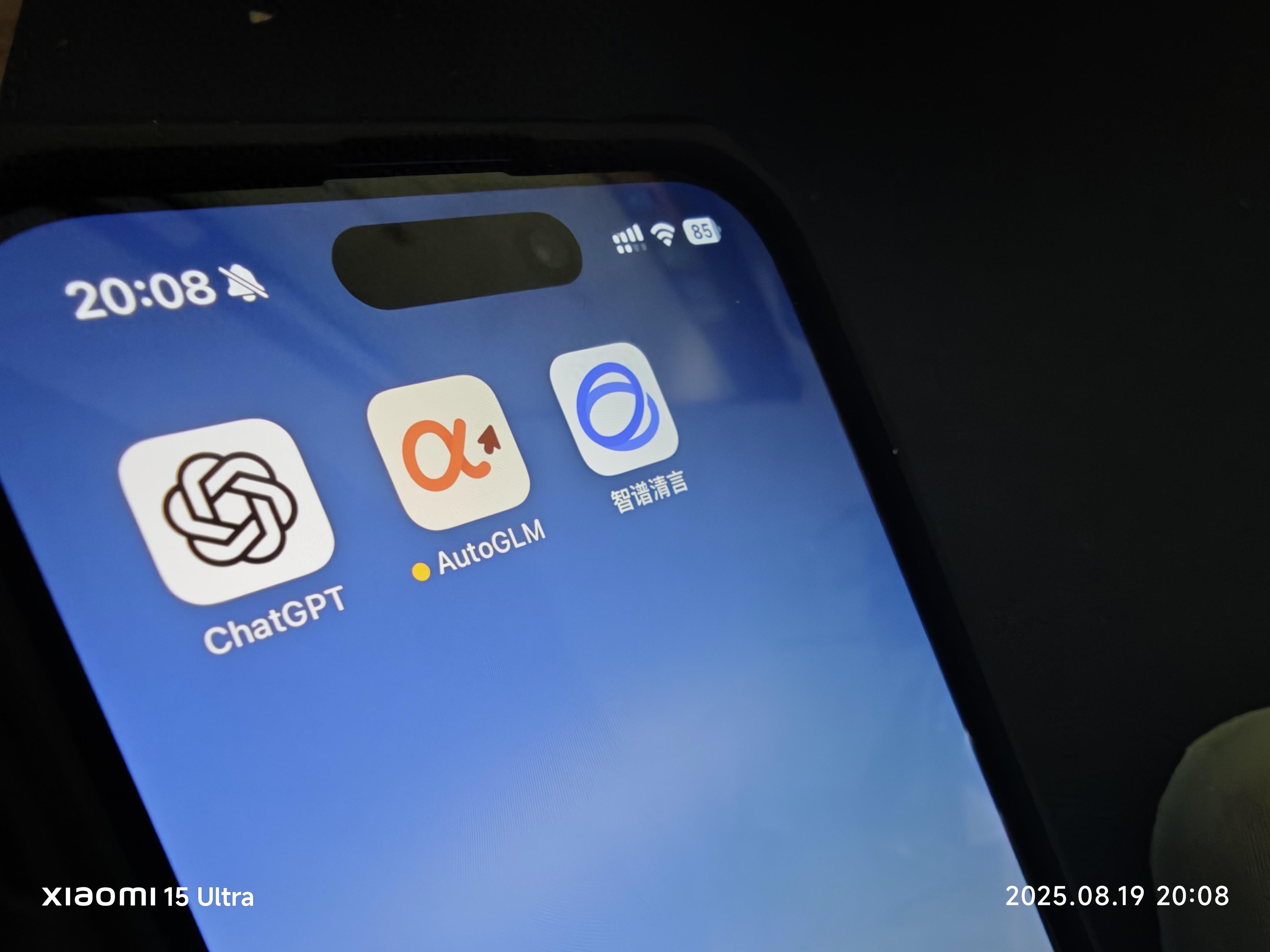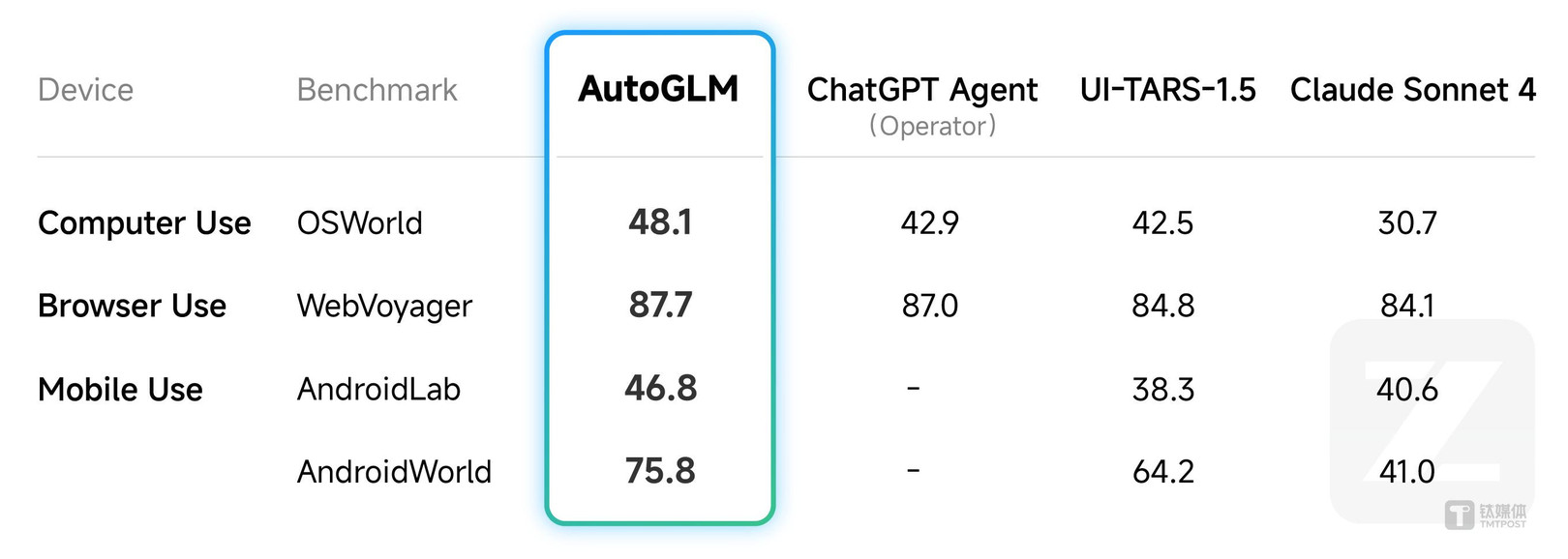
TMTPOST -- Chinese AI firm Zhipu on Wednesday announced the launch of its next-generation AI agent application, AutoGLM 2.0, positioning itself at the forefront of the global AI competition.
This marks a major milestone for the company and the broader AI industry, as it introduces the world’s first mobile-first AI agent application, powered entirely by homegrown models.
AutoGLM 2.0 leverages Zhipu’s GLM-4.5 and GLM-4.5V models, offering advanced capabilities in reasoning, coding, multimodal processing, and more. The application is now available across all major platforms, including iOS, Android, and web, while technologies such as Agent+ and cloud phone allow it to operate seamlessly on any device. Users can now rely on AI agents for a wide array of tasks, breaking through previous hardware and platform limitations.
During a pre-release media briefing, Zhipu CEO Zhang Peng explained the shift in focus from the company’s foundational GLM 4.5 series, which primarily served enterprise and developer users, to a consumer-oriented AI agent. “With AutoGLM, it’s as if you suddenly have a team of assistants working alongside you. In the future, your abilities will no longer be determined solely by yourself, but by 1 (you) + N (multiple agents, a multi-agent system), allowing many intelligent agents to help you get things done,” Zhang said.
The timing of Zhipu’s announcement comes amid growing international attention on China’s AI industry.
OpenAI co-founder and CEO Sam Altman cautioned that the United States may be underestimating the scale and complexity of China’s progress in artificial intelligence, and questioned whether export controls can effectively curb Beijing’s advances, CNBC reported Monday.
“I’m worried about China,” Altman told reporters in San Francisco, adding that the U.S.-China AI rivalry is far more complex than a simple contest of who is ahead. “There’s inference capacity, where China probably can build faster. There’s research, there’s product; a lot of layers to the whole thing. I don’t think it’ll be as simple as: Is the U.S. or China ahead?”
Altman also suggested that Washington’s restrictions on semiconductors may not be keeping pace with technological realities. Asked whether it would be reassuring if fewer GPUs reached China, he replied: “My instinct is that doesn’t work.”
Statistics underline the scale of China’s AI growth. In 2024, the Chinese AI market exceeded 700 billion yuan, maintaining annual growth above 20% for several years. As of March 2025, 346 generative AI services had completed regulatory filings, and China’s DeepSeek application became the world’s fastest-growing generative AI platform by user growth. These developments indicate that the AI competition between China and the US is intensifying across both technology and application domains.
Over the past three years, Zhipu has steadily evolved its agent platform. Beginning with the launch of AgentBench in April 2023, followed by All Tools in January 2024—which allowed automatic invocation of code interpreters, web browsers, and text-to-image tools—the company laid the groundwork for more sophisticated AI agents. April 2024 saw the release of AutoWebGLM and partnerships with hardware giants such as Qualcomm, Samsung, Intel, HONOR, and ASUS, advancing large model deployment across devices and intelligent assistants.
In November 2024, Zhipu unveiled AutoGLM and GLM-PC at its GLM OpenDay event. AutoGLM became the company’s first consumer-facing agent, capable of simulating human smartphone operations through text or voice commands, effectively bridging the gap from “language” to “action.” GLM-PC focused on desktop applications, using visual reasoning and task planning to autonomously execute complex instructions. These early products demonstrated Zhipu’s ability to integrate task planning, tool use, and self-correction into large AI models.
AutoGLM 2.0, released on August 20, represents a qualitative leap from these predecessors. Whereas version 1.0 primarily facilitated specific mobile and scenario-based operations, version 2.0 operates as a true execution assistant. It autonomously completes tasks in the cloud, ranging from coding and research to GUI operations, reasoning, and multi-agent coordination. The system dynamically selects the most suitable “brain” for each task, leveraging multiple breakthroughs in end-to-end asynchronous reinforcement learning.
Liu Xiao, technical lead for AutoGLM, highlighted three “A” principles that guide the transition from agent intelligence to Artificial General Intelligence (AGI): Around-the-clock operation, allowing agents to continue executing tasks even when users are offline; Autonomy without interference, ensuring that agents run independently without occupying users’ screens or computing resources; and Affinity, enabling seamless interaction across phones, computers, watches, glasses, home appliances, and other devices. Liu noted, “Everyone has a different definition of AGI. It’s a broad concept with both upper and lower bounds.”
Benchmark testing reinforces AutoGLM’s performance. In the Device Use tests, covering mobile, computer, and web operations, AutoGLM outperformed ChatGPT Agent, UI-TARS-1.5, and Claude 4 Sonnet, particularly scoring 48.1 on OSWorld, far ahead of competitors. This underscores the potential shift from AI as a mere conversational tool to an actionable assistant capable of executing complex workflows.
Since its inception, Zhipu has attracted extensive capital support, including 11 financing rounds totaling over 12.5 billion yuan. Investors range from private equity firms such as Sequoia China, Hillhouse Capital, Shunwei Capital, and Legend Capital to major corporates including Alibaba, Tencent, Meituan, TAL Education, and 37 Interactive Entertainment. State-owned capital from Beijing, Hangzhou, and Zhuhai, as well as co-investment from a Saudi Aramco fund, further strengthen Zhipu’s backing.
Zhipu is expected to complete its IPO guidance soon, aiming to list on the Shanghai Stock Exchange and Hong Kong Stock Exchange. The move positions the company to expand both domestically and internationally, particularly in emerging markets, where Zhipu has already established early deployments of foundational AI infrastructure.

Altman has repeatedly expressed concerns over China’s rapid AI development. Despite escalating US export controls on advanced chips, he argues that such measures cannot fully contain technological progress. “You can impose export controls on a certain item, but it might not be the critical one… People might build wafer fabs or find other ways to circumvent the restrictions,” Altman stated, reflecting skepticism over the effectiveness of US policies. He also acknowledged that the rise of Chinese open-source models, such as Kimi K2 and DeepSeek, has influenced OpenAI’s own model release strategies, prompting the company to make gpt-oss-120b and gpt-oss-20b available for free and developer customization.
At the same time, the US is taking a proactive approach. In July 2025, the Trump administration introduced an “AI Star Wars” plan, encompassing three executive orders and more than 90 policy actions to strengthen domestic AI capabilities, enhance infrastructure, and promote international collaboration. Experts note that the plan emphasizes selective regulation, focusing on politically sensitive issues while leaving other areas—such as data access and copyright enforcement—less regulated, highlighting a “light regulation, heavy development” philosophy.
2025 has been widely recognized as the “Year of the Intelligent Agent Boom.” Leading Chinese internet firms, including Baidu, Alibaba, Tencent, ByteDance, and 360, are aggressively investing in AI agents, moving the market from individual operations to collaborative multi-agent systems. Over 50 new intelligent agent products were launched in the first half of 2025 alone. ByteDance’s Kouzi Space now supports 14 plugin integrations, while 360’s “multi-agent swarm” marks a milestone in productivity-focused agent deployment.
Zhipu’s AutoGLM 2.0 exemplifies this trend. Unlike traditional chatbots, it functions as an autonomous digital workforce capable of executing complex tasks across devices, saving time and energy, and fundamentally transforming human-AI collaboration. By integrating task planning, reasoning, and action, Zhipu envisions a future where AI agents are indispensable tools in daily life and professional settings.
Both Zhipu and OpenAI see AI agents as a transformative force for productivity. Altman projects that by 2025, agents will handle sophisticated programming and operational tasks; by 2026, they will autonomously discover knowledge and develop decision-making frameworks; and by 2027, they will enter the physical world as “digital labor,” creating tangible business value. IDC research estimates that 60% of large enterprises will adopt collaborative agent systems by 2027, increasing business process efficiency by over 50%.
Zhang Peng emphasizes the global opportunity, noting that AI advancements are not confined to the US or China. “The AI wave will bring tremendous opportunities to all countries,” he said, underscoring Zhipu’s commitment to helping overseas clients develop independent AI capabilities without reliance on behind-the-scenes backers.
The launch of AutoGLM 2.0 marks a new chapter in the global AI landscape, showcasing China’s rapid progress in intelligent agents. With deep domestic investment, global expansion, and ambitious technological breakthroughs, Zhipu is poised to challenge the dominance of US AI firms and redefine the role of AI in both work and everyday life. At the same time, the intensifying US-China AI competition highlights the strategic and economic significance of this rapidly evolving sector, which is increasingly shaping the global technology ecosystem.
As AI agents transition from conversation tools to autonomous digital labor, both companies and users may soon witness a transformation in productivity, collaboration, and the very nature of human-AI interaction. AutoGLM 2.0 represents not just a product launch, but a signal of the shifting balance in global AI leadership, where innovation, policy, and capital converge to define the next era of technological competition.









